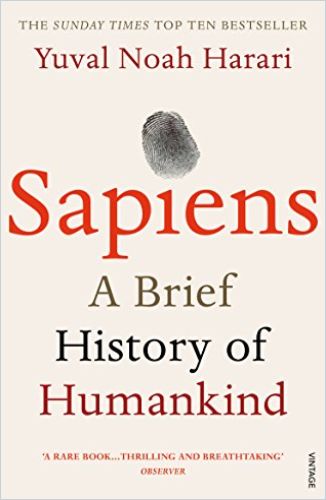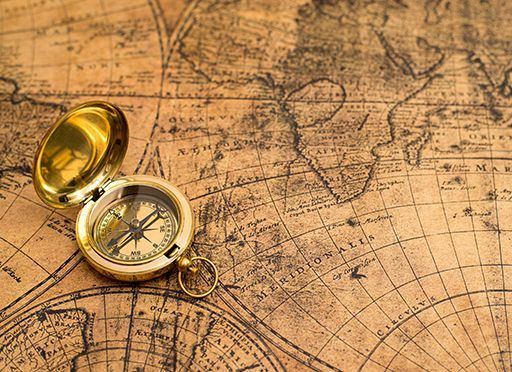Best-selling author and thinker Yuval Noah Harari offers a different, learned perspective on the history of human beings.

A Different History
Professor Yuval Noah Harari, PhD – a much-celebrated public intellectual – lectures at the Hebrew University of Jerusalem. His books have sold more than 27 million copies in 60 languages worldwide. Never one to evade the big questions, Harari, in this New York Times number one bestseller, takes on nothing less than the history of the world.
The Wall Street Journal called this, “learned, thought-provoking and crisply written.” President Barack Obama said Harari’s ideas, “give you a sense of perspective on how briefly we’ve been on this Earth, how short things like agriculture and science have been around, and why it makes sense for us to not take them for granted.”
Homo sapiens
Humanity began with six similar species, Harari explains. Homo sapiens had the evolutionary advantages of a large brain, fine hands, and the desire to socialize and raise offspring.
About 70,000 years ago, organisms belonging to the species Homo Sapiens started to form even more elaborate structures called cultures. The subsequent development of these human cultures is called history.Yuval Noah Harari
From East Africa, these sapiens flowed into Europe. Harari theorizes that Homo sapiens either intermarried with or eradicated the Neanderthals. The sapiens, Harari notes, made weapons, sewed clothes, built boats and created art.
Gossip
The initial value of language, Harai posits, was to allow sapiens to describe the lion in the tall grass – to provide warnings. Language allowed gossip, which, Harari explains, enabled people to discuss each other’s trustworthiness. That encouraged commerce and cooperation, at least in groups of up to 150 people. Language, the author believes, enabled people to share ideas and dreams, which spawned trade, religion and ideology.
Agricultural Revolution
When the Agricultural Revolution began about 12,000 years ago, Homo sapiens grew plants, herded animals and domesticated the environment. Harari asserts that this process began on several continents at once. He maintains, contrary to common wisdom, that the Agricultural Revolution led to population growth, social stratification and conflict, but it did not make people happier or give them more free time. More food allowed people to have more children, thus creating more demand for wheat at the expense of other crops. This meant, Harari insists, more hoeing and plowing, and increased anxiety about pestilence, war or sufficient rain.
Empires, Currency and Religions
The Code of Hammurabi, though regarded as a code of laws, was, Harari believes, a handbook of who was who in the state and family, noting each citizen’s monetary worth. The Code make sure that every citizen understood and agreed to society’s hierarchic nature and supported the empire’s raison d’être: to grow and distribute food, to conquer new territory and, thus, to enrich itself and enhance security.
Homo sapiens have no natural rights, just as spiders, hyenas and chimpanzees have no natural rights. But don’t tell that to our servants, lest they murder us at night.Yuval Noah Harari
Harari compares the Code to the United States’ Declaration of Independence, which promotes equality rather than hierarchy. The framers of both documents claimed to express universal principles and to delineate a natural, inevitable order of humankind. No matter how sanctified, noble or beautifully expressed these codes are, Harari stresses, they cannot dispel underlying convictions – themselves the products of myths.
Devastation
Harari notes the power of science and technology, and concedes that they are linked to industrial, military or religious empires. As these powers conquered territory, and took gold and knowledge, Harari cautions, they also devastated lands and culture.
He revels in an apocryphal story told when astronauts Neil Armstrong and Buzz Aldrin were training to become the first humans on the moon. A Native American asked them to take a secret message to the moon spirits. The astronauts memorized the message and later sought a translation, which was: “Don’t believe a single word these people are telling you. They have come to steal your lands.”
Modern Capitalism
Harari sets the beginning of modern capitalism in 1568, when Dutch Protestants broke with Spanish Catholics and founded Europe’s wealthiest empire. Using credit, they funded corporate armadas and mercenary armies for conquests from Indonesia to Manhattan. Dutch settlers built a wall along a Manhattan roadway that eventually came to be called Wall Street.
Economic growth also requires energy and raw materials and these are finite.Yuval Noah Harari
The free market created tremendous wealth, but, Harari warns, it also spins a web of contradictions and addictions. It demands ever-increasing consumption at the expense of communities and families.
Harari identifies humankind’s great question not as, “‘What do we want to become?”, but as, “What do we want to want?” The author concludes sadly that humanity wreaks havoc on itself and its home with little thought or commitment to its responsibilities.
Brilliant Debunker
Harari casts himself as a debunker. He explicates popular concepts of history and historical processes and explains why his insights invalidate them. These moments prove the least compelling in this comprehensive overview and add little to the considerable knowledge he offers. Harari’s gift, instead, is the astonishing breadth and depth of his interests and knowledge. He is only occasionally pretentious, and he consistently raises compelling questions in conversational and accessible language. Harari’s a worthy writer, but rapid readability is not his goal. He wants you to think, to muse and to digest his ideas. Happily, most of them warrant your consideration.
Harari’s other compelling, thoughtful books include Homo Deus and 21 Lessons for the 21st Century.





